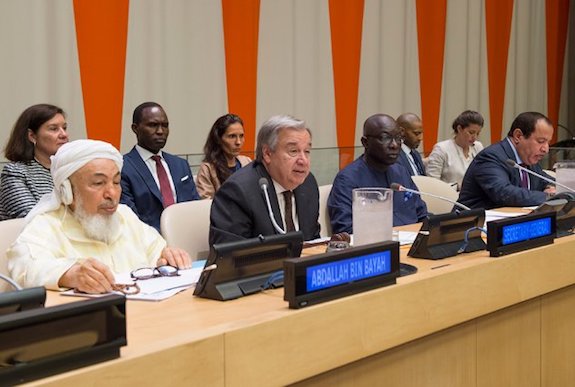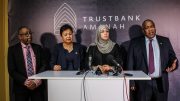From 23 to 24 April 2015, Mr Adama Dieng, the United Nations General Secretary’s Special Adviser on the Prevention of Genocide, the Centre and the Government of Morocco organized the first in a series of forums with and for religious leaders. The first Forum took place in Fez, Morocco, and brought together 26 representatives of different religions and faiths and faith based organisations, as well as religious scholars and experts, both women and men, from Africa, Asia, Europe and the Middle East.
Participants were briefed on the international legal framework for the prevention of atrocity crimes, the elements of the crimes, and strategies for identifying and responding to incitement to violence that could lead to atrocity crimes. The constructive discussions on the role of religious leaders and faith based organizations in preventing and countering incitement resulted in the Action Plan for religious leaders to prevent incitement which could lead to atrocity crimes. Participants also agreed on the elements of a draft declaration of principles (the “Fez Declaration”).
Both the Action Plan and Declaration were reviewed at five successive regional meetings with religious leaders in Africa, the Americas, Europe, and the Middle East and North Africa, and the Asia-Pacific. At each regional meeting, participants: discussed the following topics:
- The risk factors for atrocity crimes and the link between hate speech/incitement and atrocity crimes;
- The role of religious leaders and faith based organisations in preventing or curbing hate speech and incitement that could lead to atrocity crimes in the Asia and the Pacific region;
- How religious leaders have successfully prevented incitement, including through counter-speech and other measures, in the Asia-Pacific region; have
- The preventive measures that religious leaders take to prevent and respond to incitement, based on the Plan of Action;
- Discuss how countering and preventing incitement can increase the resilience of to atrocity crimes.

Fez Plan Participants
Each regional meeting serves to develop a regional strategy for implementing the Action Plan. United Nations Secretary General António Guterres, along with religious leaders of the world, announced the launch of this new initiative to curb atrocities rooted in faith-based incitements to violence, on Friday July 14th 2017 in New York.
“Around the world, we see how religion is being twisted – cynically manipulated – to justify incitement to violence and discrimination,” Guterres said. “We see an alarming rise in online and offline hate speech — messages that spread hostility and hatred and encourage populations to commit violence against individuals or communities, often based on their identity. Hate speech sows the seeds of suspicion, mistrust and intolerance.”
In his remarks, Mr. Guterres cautioned against the proliferation of hate speech – both online and offline – and said that such messages spread hostility and hatred, and encourage populations to commit violence against individuals or communities, often based on their identity.
“Hate speech sows the seeds of suspicion, mistrust and intolerance [and] over time, it can play an important role in convincing people that violence is logical, justifiable, even necessary,” added Mr. Guterres, joined by UN Special Adviser on the Prevention of Genocide, Adama Dieng, and a number of religious leaders from around the world.
Hate speech is one of the most common warning signs of atrocity crimes, Mr. Guterres said, noting that early action can be taken to prevent them from occurring and that religious leaders are key actors in that warning process.
Also in his remarks, Mr. Guterres highlighted the commitment expressed in the Plan of Action for Religious Leaders and Actors to Prevent Incitement to Violence that Could Lead to Atrocity Crimes to promote peace, understanding, mutual respect and the fundamental rights of all people.
He said the Plan sets out a broad range of ways in which religious leaders can prevent incitement to violence and contribute to peace and stability.
“These principles summon us to show respect for all human beings, even those with whom we might profoundly disagree or whose cultures might seem alien,” he said, calling for the widest possible dissemination and implementation of the Plan of Action.
“Let us work together to prevent and end atrocity crimes and all affronts to human rights and dignity,” he stated.
He was joined by Adama Dieng of Senegal, the UN Special Adviser on the Prevention of Genocide. Dieng said the plan has been designed to counter the kind of ideology that led to the genocide against the Yazidi minority group at the hands of Islamic State (ISIL) militants.
The plan relies on the role of faith leaders in preventing violence and taking early action in conflicts that may escalate into genocide, crimes against humanity and war crimes.
“The voice, the authority, and the example of religious leaders are critical,” Guterres said.
Among those leaders was Abdallah bin Bayah, a globally recognized Islamic scholar and jurist from Mauritania who studied law in Tunisia. He is known for his calls to peace and opposition to terrorism.
Also on hand was Faisal Bin Muaammar of Saudi Arabia, head of the KAICIID international dialogue center in Austria that worked closely with World Council of Churches and other groups on the plan.
In all, a total of 232 religious leaders and actors from 77 countries, including the United States, took part in the consultations. Participants included Buddhists, Christians, Muslims, Hindus, Jews and Sikhs from different groups and denominations, as well as representatives from various religious minorities, including Bahai, Kakai, Yazidi, and Candomblé, and humanists. At least 30 percent of participants at all meetings were women.





Be the first to comment on "UN SG, faith leaders launch Fez Plan of Action on religious violence"